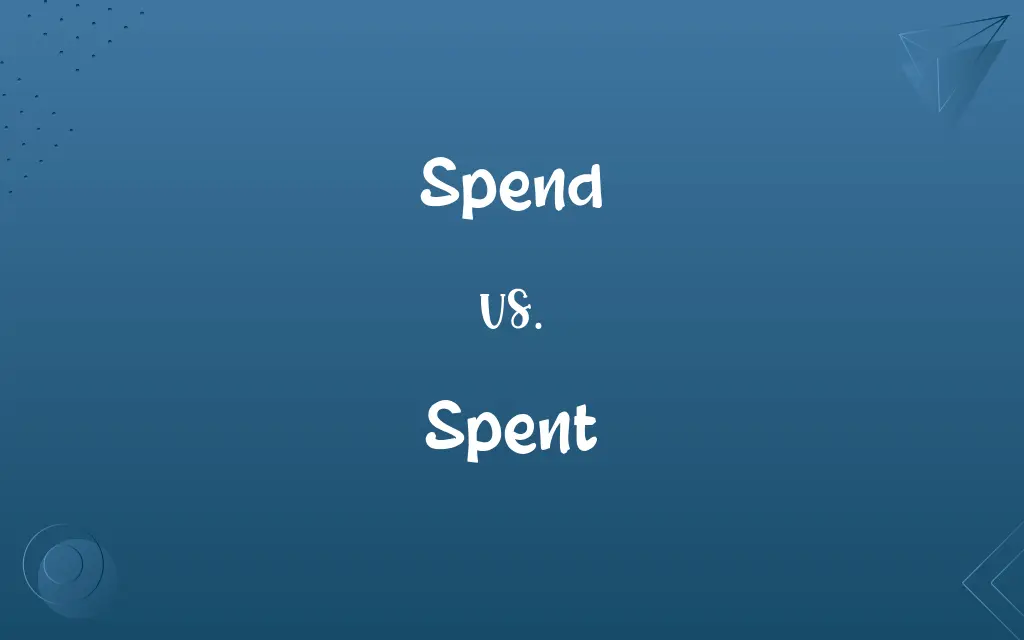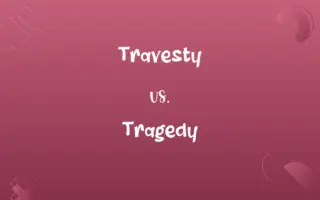Spend vs. Spent: Know the Difference

By Hifza Nasir & Shumaila Saeed || Published on October 23, 2024
"Spend" is the present tense verb for using money or time, while "spent" is its past tense, indicating the action has already occurred.

Key Differences
"Spend" and "spent" reflect different timeframes of the same action. "Spend" is used when referring to the act of using money or time in the present or future tense. For example, planning to spend a certain amount on groceries. "Spent," on the other hand, is used for actions that have been completed in the past, such as having spent all your savings on a vacation.
Shumaila Saeed
Oct 23, 2024
The context in which "spend" and "spent" are used can significantly affect the meaning of a sentence. Using "spend" suggests an ongoing or future action, emphasizing current decisions or plans. In contrast, "spent" conveys completion, often reflecting on past actions and their consequences or outcomes.
Shumaila Saeed
Oct 23, 2024
In terms of grammatical structure, "spend" can be modified to fit different tenses beyond the present, such as the future tense ("will spend") or the present continuous ("am spending"), reflecting the versatility of the verb. "Spent" is primarily used in the simple past but can also serve as a past participle in perfect tense constructions ("have spent").
Hifza Nasir
Oct 23, 2024
The choice between "spend" and "spent" also influences the tone of financial or time management discussions. Discussing how money or time is spent often involves reflection or evaluation of past actions, while planning how to spend resources focuses on future intentions or current actions.
Hifza Nasir
Oct 23, 2024
Understanding the correct usage of "spend" and "spent" is crucial for clear communication, especially in formal writing or when detailing financial transactions and time management plans. Misuse can lead to confusion about the timing of actions.
Shumaila Saeed
Oct 23, 2024
ADVERTISEMENT
Comparison Chart
Grammatical Forms
Can be used in various tenses
Primarily used in the simple past and as a past participle
Hifza Nasir
Oct 23, 2024
ADVERTISEMENT
Spend and Spent Definitions
Spend
Involving current or future action.
We plan to spend the holiday in Spain.
Shumaila Saeed
Feb 27, 2024
ADVERTISEMENT
Spend
To consume; to waste; to squander; to exhaust; as, to spend an estate in gaming or other vices.
Hifza Nasir
Jan 12, 2024
Spend
To pass (time) in a specified manner or place.
Spent their vacation in Paris.
Hifza Nasir
Jan 12, 2024
Spent
Having been put to use and therefore unavailable for use.
Spent shell casings.
Hifza Nasir
Jan 12, 2024
Spend
Amount of money spent (during a period); expenditure.
I’m sorry, boss, but the advertising spend exceeded the budget again this month.
Hifza Nasir
Jan 12, 2024
Spend
To exhaust of force or strength; to waste; to wear away; as, the violence of the waves was spent.
Their bodies spent with long labor and thirst.
Hifza Nasir
Jan 12, 2024
Spend
To expend money or any other possession; to consume, use, waste, or part with, anything; as, he who gets easily spends freely.
He spends as a person who knows that he must come to a reckoning.
Hifza Nasir
Jan 12, 2024
Spend
To weigh or lay out; to dispose of; to part with; as, to spend money for clothing.
Spend thou that in the town.
Wherefore do ye spend money for that which is not bread?
Hifza Nasir
Jan 12, 2024
Spend
To bestow; to employ; - often with on or upon.
I . . . am never loathTo spend my judgment.
Hifza Nasir
Jan 12, 2024
Repeatedly Asked Queries
What is the difference between "spend" and "spent"?
"Spend" refers to the present or future use of money or time, while "spent" indicates past usage.
Shumaila Saeed
Oct 23, 2024
What does "well-spent" mean?
It implies that the money or time was used wisely or effectively, e.g., It was a day well-spent.
Hifza Nasir
Oct 23, 2024
Can "spend" be used in continuous tenses?
Yes, e.g., I am spending too much lately.
Shumaila Saeed
Oct 23, 2024
How do I use "spend" in future tense?
By adding "will" before "spend," e.g., I will spend more time studying.
Hifza Nasir
Oct 23, 2024
How do I use "spent" in perfect tenses?
By combining it with "have" or "had," e.g., I have spent all my allowance.
Shumaila Saeed
Oct 23, 2024
How does context affect the use of "spend" and "spent"?
The context determines whether you are discussing current, future, or past actions, affecting which form to use.
Dua Fatima
Oct 23, 2024
Can "spend" and "spent" be used in financial reports?
Yes, they are commonly used to discuss financial transactions and budgeting.
Hifza Nasir
Oct 23, 2024
Is "spent" only related to money?
No, it can also refer to time or energy, e.g., I spent the afternoon gardening.
Shumaila Saeed
Oct 23, 2024
Can "spent" be used without an object?
Yes, in contexts implying exhaustion, e.g., After the marathon, I was completely spent.
Shumaila Saeed
Oct 23, 2024
How can I improve my use of "spend" and "spent"?
Practice by writing sentences in different tenses and contexts to understand their usage better.
Hifza Nasir
Oct 23, 2024
What's the difference in usage between "spend" in the present and "will spend"?
"Spend" in the present indicates current action, while "will spend" focuses on future intentions.
Hifza Nasir
Oct 23, 2024
Can "spent" imply physical exhaustion?
Yes, it can indicate being extremely tired, e.g., After the hike, we were spent.
Dua Fatima
Oct 23, 2024
What is a synonym for "spent" in the context of exhaustion?
"Exhausted" or "depleted" can be synonyms depending on the context.
Hifza Nasir
Oct 23, 2024
How can I remember the difference between "spend" and "spent"?
Associate "spend" with current or future actions and "spent" with past actions or states of being.
Shumaila Saeed
Oct 23, 2024
Is it correct to say "I spend yesterday at the park"?
No, for past actions use "spent," e.g., I spent yesterday at the park.
Hifza Nasir
Oct 23, 2024
Share this page
Link for your blog / website
HTML
Link to share via messenger
About Author
Written by
Hifza NasirCo-written by
Shumaila SaeedShumaila Saeed, an expert content creator with 6 years of experience, specializes in distilling complex topics into easily digestible comparisons, shining a light on the nuances that both inform and educate readers with clarity and accuracy.








































































